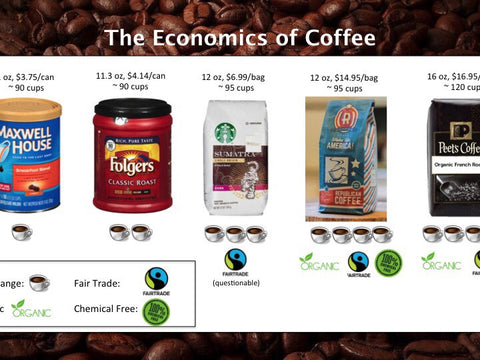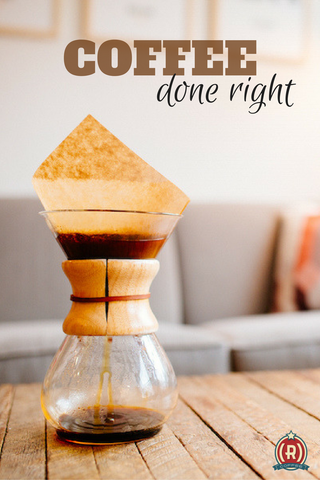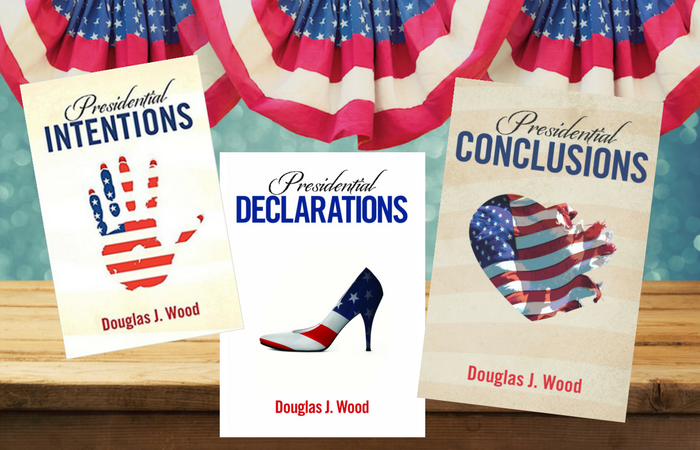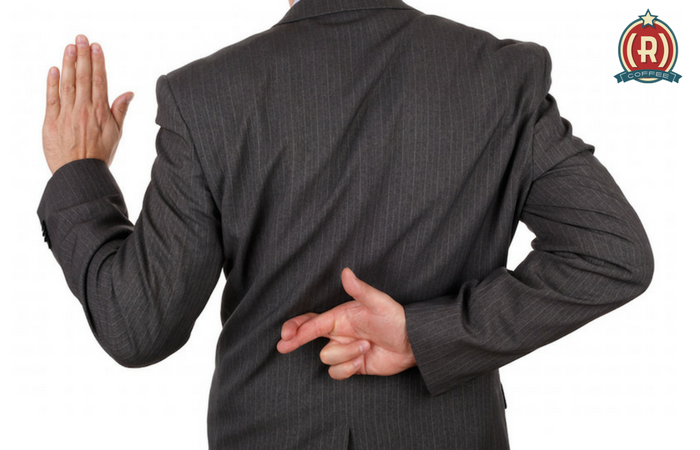This is a question that has come up from time to time on the Republican Coffee Facebook page. The short answer is that high quality coffee – and ours is! – is individually sourced, hand processed and packed, and shipped to you by a small business. If you would like to read more about our business, go to this page. We really are a small business of real people (you wouldn’t believe how many people doubt that!) who created a quality product to spread an optimistic message.
Beyond that, there are some stark differences between our coffee and some of the grocery store brands you may be used to.
The Difference Between Our Coffee and Grocery Store Coffee
We’ve all heard the phrase, “you get what you pay for.” This can be applied to a lot of things: vehicles, shoes, technology, beauty products, and -- for we coffee enthusiasts -- coffee beans. Have you ever wondered why our coffee is more expensive than the variety you find at the grocery store? Why would someone spend so much more on beans when you can get 2-3 times more of the mass marketed coffee for the same price or even less? Here we take a brief look at the economics of our coffee, as well as the benefits to purchasing and consuming our coffee. Hint: It’s not to just help our bottom line. J
Fair Trade. Single Origin. Non-GMO. Organic. These seem to be buzzwords in the trendy coffeehouses these days, but these terms really mean something when it comes to the quality of bean you’re getting.
If you’re picking up a drum of Maxwell House or Chock Full O’Beans at your supermarket, it’s not going to be single-origin. Single-origin coffees by nature are more expensive as they come from (you guessed it) one location instead of multiple places. The coffee you get at the store is almost always a blend, meaning companies can pool together beans from various origins and varying grades of coffee. Coffee gets graded just as many other food items do (think Grade A eggs, Grade B maple syrup, etc.), making consumers aware of the tangible qualities of what they are purchasing. The lower the grade of coffee, the cheaper it will be to purchase, roast and sell.
Many people think getting a coffee blend is a sophisticated thing, but to be honest with you, it’s not. Blended origins almost always mean you’re getting a few decent beans, but also some crappy ones that don’t roast evenly, have chaff and other parts of the coffee cherry blended in, and possibly even mold (yikes!) that you won’t find in a higher-quality, single-origin coffee.
Single Origin beans will give you the most consistent quality
Your supermarket special is also not going to be fair trade, meaning the farmers are likely not getting paid or treated well for their hard work. It’s a sterile transaction, where you don’t know the names or faces of your coffee providers, or even if those who worked to produce the coffee beans will get what they were promised. It’s also usually not certified organic or non-GMO, which means you’re probably drinking coffee that’s laden with chemicals, pesticides, even mold as mentioned above, doing way more harm to your body than good. These beans were roasted who knows how long ago, meaning the taste has greatly diminished.
Additionally, mass-marketed coffees are also often found packaged in plastic containers, which means a couple of things: 1) your beans are stale, as plastic is a horrible storage container for beans 2) the beans have absorbed leached plastic from the inside of the container as they’ve de-gassed and the oily exterior has come in contact with the plastic. In short, even if you claim you can’t taste the difference and you buy the cheap stuff just to save a few bucks, you’re putting all kinds of nastiness into your body in the name of caffeine and a hot cup of joe.
If you look further into the economics of coffee (looking past the terrible quality of most of the mass-marketed beans), roasters and coffee-sellers must factor in the cost to negotiate green bean prices, the price to ship the beans in, get them roasted, packaged, then shipped to their destination. Factor in shrinkage of the beans, as well as practical things like the cost of electricity and space to roast, store, temperature-control the beans, their packaging, etc. and that will impact the end pricing of your coffee, too. We’ve included an infographic giving you a visual overview of pricing and quality of some of the most-recognized mass-marketed coffees compared to ours:

You are part of the Story of our coffee
Enough of the logistical side: here’s why it’s actually a helpful thing to buy with us versus the big-box retailers. When you buy our coffee, you’re part of a larger mission, one that's changing the lives of our coffee farmers and their families for the better, one cup at a time. Our coffee is fair-trade. It is organic and non-GMO. There are no chemicals, no mold, nothing but beans in every bag we roast, package and sell to you.
It’s sustainably sourced. These farmers are directly impacted by every sale we make, and it provides a better way of life because we’ve been able to partner with them and share their single-origin beans with you. Our roaster has personally met and visited with these farmers and their families, knows them by name and stays in contact with them. He has seen where the coffee plants are growing, has witnessed the coffee farmers’ children even as small as toddler-aged, walking the farm and helping to pick out the best coffee cherries to be soaked, cracked, and exported. They’re so excited to have opportunity to create a better life for their family because of our initiative.
And we especially love sharing their stories with you because you can see how something as simple as drinking a great cup of coffee can truly change others’ lives and impact the world for the better.
Ready to change the world with great coffee? Click here!

Like what you see? Please pin it and share it!
(Information Sources: https://www.quora.com/Why-is-single-origin-coffee-more-expensive-than-a-blend,
http://drinks.seriouseats.com/2013/01/why-is-coffee-so-expensive-hidden-costs-roasting-beans-prices.html
, http://thekrazycouponlady.com/finance/a-wake-up-call-a-price-comparison-of-popular-coffee-options/, )




